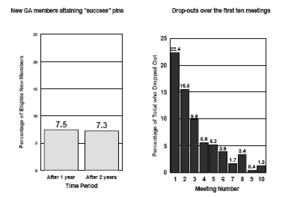Gamblers Anonymous (GA) is a 12-step fellowship designed to offer support and community to those who are having a gambling problem. While anecdotal evidence exists as to the benefit of GA for certain individuals, overall effectiveness of GA as a therapeutic intervention is difficult to measure. Obstacles to measuring GA’s efficacy include 1) a lack of reliable record keeping, due to anonymity, 2) the self-report nature of information, 3) bias due to self-selection of sample, and 4) lack of a comparable control group. In addition, the criterion of success of treatment held by GA is total abstinence from gambling, which may lead to an underestimation of the benefits of GA. Stewart & Brown’s study of GA attendees in Britain revealed a high percentage of GA “dropouts”. Specifically, 22.4% of first-time attendees never returned, 58.6% had dropped out after 5 meetings, and 69.4% had dropped out after 10 meetings. After 10 meetings, therefore, only 30.6% of the original sample were still eligible for success “pins,” which are awarded to those who maintain abstinence from gambling for yearly intervals. Of this group, a similar percentage remained abstinent for one year (7.5%) as for two years (7.3%). The authors state that while GA may provide benefits beyond total abstinence for its members, other forms of treatment modalities are necessary for those who are unable to continue attending GA meetings and for those who are unable to achieve abstinence by attending GA meetings.
Source: Adapted from Stewart, R.M., & Brown, R.I.F. (1988). An outcome study of Gamblers Anonymous. British Journal of Psychiatry, 152, 284-288.





